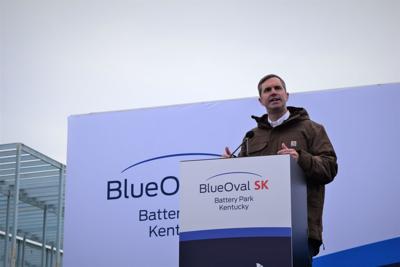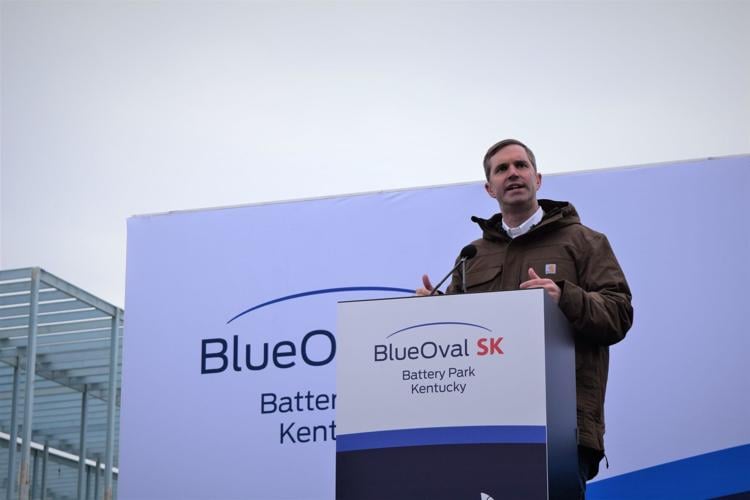LOUISVILLE, Ky. (WDRB) — When Kentucky landed the biggest economic development project in state history — a $5.8 billion pair of electric vehicle battery plants for Ford Motor Co. — the coup also came with a hefty price tag for taxpayers.
In 2022, as the EV battery factories began rising near Interstate 65 in Hardin County, the commonwealth cut checks totaling $250 million to BlueOval SK, Ford’s joint venture with Korean partner SK On.
The zero-interest, forgivable loan was the centerpiece of an incentive package offered by Democratic Gov. Andy Beshear and the state’s GOP-led legislature to secure the 5,000-job investment for the Bluegrass State.
Less than a year later, Ford threw half of the Kentucky battery campus into limbo, as the automaker scrambled to delay about $12 billion in EV-related spending.
Yet, even as the timing of one of the two Kentucky plants and its 2,500 jobs remain uncertain, BlueOval SK won’t owe Kentucky taxpayers any of the $250 million back anytime soon, if ever.
The state’s 2022 deal gives BlueOval SK until Dec. 31, 2030 to reach the full, 5,000-job target for the battery campus, according to records of the Kentucky Economic Development Finance Authority. The deal allows for a gradual ramp up of hiring, beginning at the end of 2026 with a target of 2,500 jobs and escalating annually until 2030.
Ford and SK are still building two side-by-side plants in Kentucky, but equipment, hiring and production are indefinitely delayed at the second of the two factories.
“Through our communication with (BlueOval SK), it has always been our understanding that the two facilities would be constructed simultaneously though operational timelines could vary between the facilities,” Brandon Mattingly, spokesman for the Kentucky Economic Development Cabinet, said in an emailed statement.
For its part, BlueOval SK “remains committed to complying with the conditions of the Kentucky loan,” spokeswoman Mallory Cooke said.
Kentucky is among a handful of states primarily in the southeast and Midwest to benefit from a bonanza in EV-related manufacturing investments and jobs in recent years.
Since 2018, more than $135 billion in EV investments have been announced in North America, with Michigan, Georgia and North Carolina capturing the highest shares, according to an analysis by the Center for Automotive Research in Ann Arbor, Michigan.
The new battery factories, EV assembly lines and supplier plants have been spurred mostly by billions in federal government subsidies unlocked by President Biden’s Inflation Reduction Act.
“Our message to the states has been, don’t overspend on these things, because Uncle Sam is already gold-plating them,” said Greg LeRoy, executive director of Good Jobs First, a Washington, D.C. nonprofit organization that promotes accountability in economic development subsidy deals.
Yet, governors and legislatures have spent heavily to secure their share of the EV windfall, with some state deals valued in the billions.
Automakers are now pumping the brakes on EV investments as the growth rate of electric cars has slowed. So-called “early adopters” enthusiastic about the technology have made their purchases, and the industry now must convince mainstream consumers to buy EVs.
In some cases, the EV delays have resulted in state and local incentives being walked back. In others, such as Kentucky’s case, generous terms mean automakers still have plenty of time to meet their commitments.
Late last year, Ford scaled down a planned battery plant in Marshall, Michigan, saying the new factory would create about 1,700 jobs instead of the initially planned 2,500.
Michigan plans to reduce the subsidy package offered for the Marshall project accordingly, though the details have not been finalized, said Otie McKinley, spokesman for the Michigan Economic Development Corp. Media reports pegged the value of Michigan’s initial subsidy offer at about $1.8 billion.
Meanwhile, as of last September, Michigan had paid about $348 million of a $480 million grant to help General Motors convert its Orion Township factory near Detroit for production of EV pickup trucks, according to state records.
In October, GM said it would delay production of the EV trucks at the Orion factory by a year until late 2025. McKinley didn’t directly answer whether the delay would affect the incentives paid by the state.
“(I)t’s important to note that these incentives are performance-based and as such, performance benchmarks must be met in order for funds to be distributed,” he said in an email.
In Tennessee, Ford’s announcement in April that it plans to delay deliveries of an EV truck at a new factory to 2026 has no immediate ramifications for a $285 million “capital grant” in which the state agreed to reimburse Ford for costs associated with the plant’s construction.
A 2022 “accountability agreement” obtained under Tennessee’s public records law requires Ford to report the number of new jobs created at the factory annually. Whether the $285 million is subject to repayment depends only on the level of employment in 2030 to 2032, a spokeswoman for the state confirmed.
In Kentucky, BlueOval SK has already hired hundreds in anticipation of opening the first battery plant next year. The state’s $250 million deal gives the company until Dec. 31, 2026 to meet the first of ten annual employment goals.
If the factory doesn’t reach 90% of the initial target — or 2,250 jobs — BlueOval SK could owe as much as $10 million in 2027.
LeRoy, of Good Jobs First, said those terms are prudent for the state because the repayments would be triggered automatically and not at the discretion of an elected official or state bureaucrat.
“Politically, it’s a little tidier, because sometimes governors or mayors are loathe to pull the trigger on a clawback (of incentives),” he said.
Beshear, the Kentucky governor, has no concern about the viability of the BlueOval SK project, he said.
Standing before an I-65 interchange that Kentucky overhauled for the battery campus in April, Beshear brushed aside the indefinite delay of the plant, calling it a minor setback.
“You don’t go through a construction the size of this if you aren’t confident that it’s coming,” Beshear told reporters. “The timing may be months — maybe at worse, years — but we know this is the future.”
Correction: A previous version of this story misstated the length of the delay related to Ford's new EV truck to be produced in Tennessee. The delay is less than one year, though a Ford spokeswoman could not be more precise. Ford earlier said that production of the truck would begin in 2025. In April, the company said that customer deliveries of the truck would begin in 2026.














